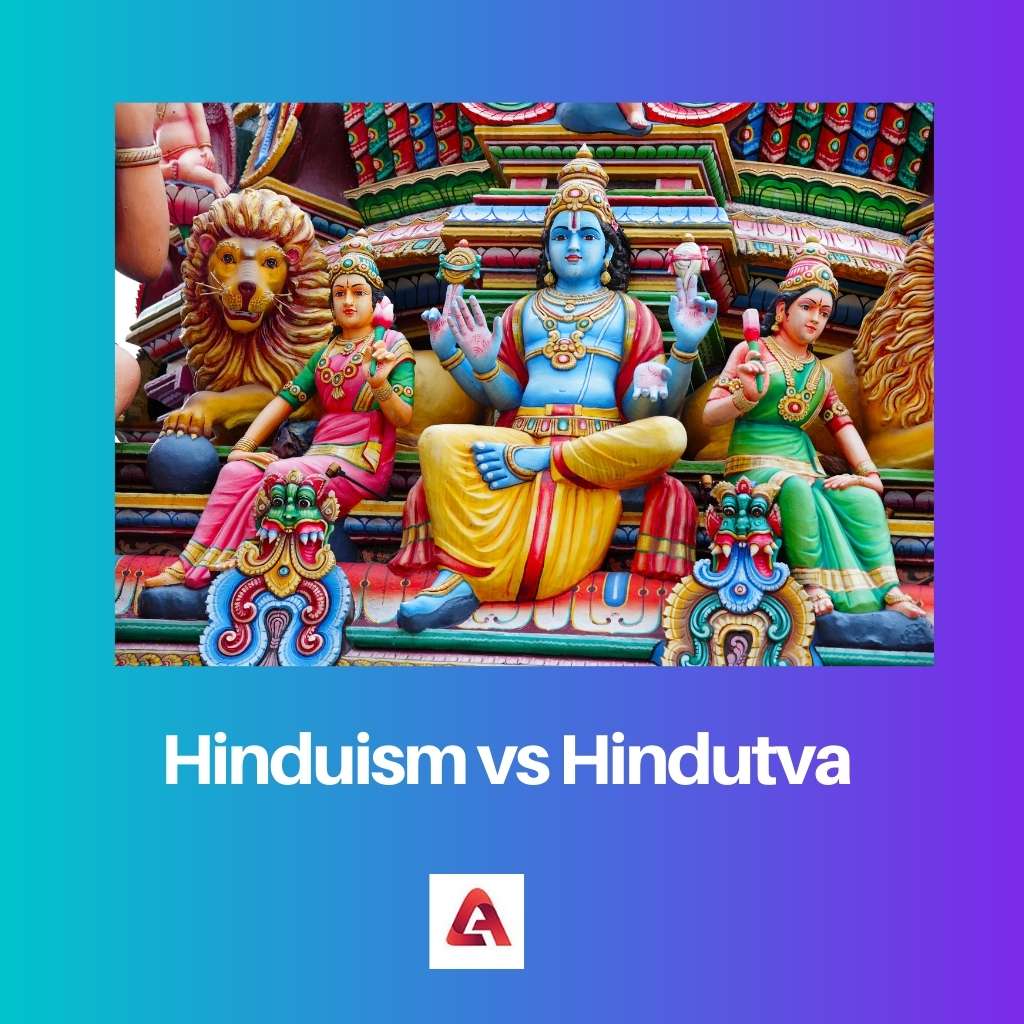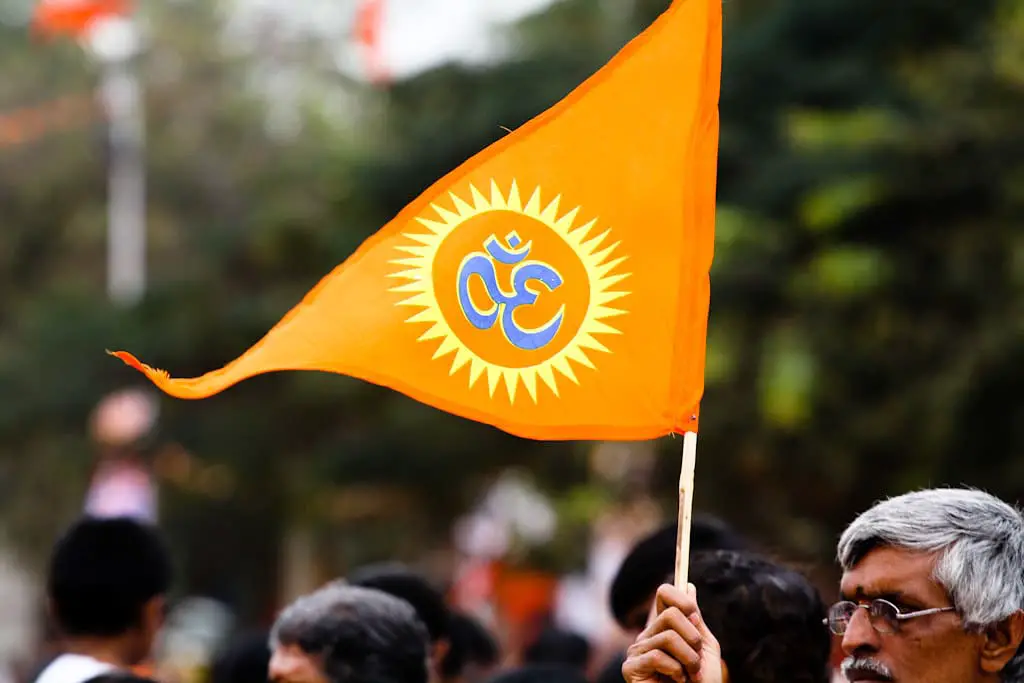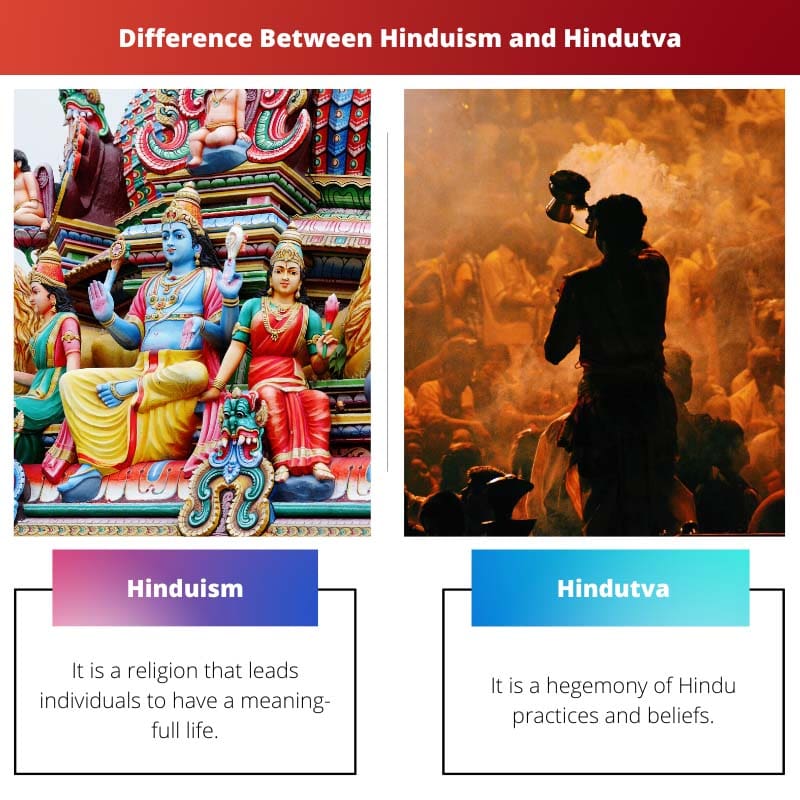The Asian culture is rich and diverse, It is home to various religions. The Indian subcontinent shows maximum diversity. However, the majority of the Indian subcontinent are Hindus.
Hindus can be further a follower of two ideologies. They are – Hinduism and Hindutva. Both have distinct features.
Key Takeaways
- Hinduism is a major world religion with diverse beliefs, practices, and philosophies, while Hindutva is a political ideology that promotes Hindu nationalism.
- Hinduism promotes tolerance and inclusivity, whereas Hindutva emphasizes a more exclusive and homogenized identity.
- Hindutva is a modern concept, whereas Hinduism has a long history dating back thousands of years.
Hinduism vs Hindutva
Hinduism is a religion originated in India and is based on diverse cultural practices and beliefs. Hindutva is a political ideology that promotes Hindu nationalism and emphasizes the need to establish a Hindu identity in India. Hindutva is driven by the belief that India belongs only to Hindus.

Hinduism is considered as a way of life by the followers of the religion, religion is the third largest religion in the world. It has a diverse system of thoughts in it.
The origin of the religion is from Sanãtana Dharma. It marks four prominent themes known as Purusārthas. These are the aims of human life.
On the other hand, Hindutva is an ideology related to politics and holds a predominant form in the religion of Hinduism. The origin of the term was to describe the quality as well as the state of being Hindu.
As a variant of the extremism of the right-wing, the movement of Hindutva is considered to have originated.
Comparison Table
| Parameters of Comparison | Hinduism | Hindutva |
|---|---|---|
| Core concept | It is a religion that leads individuals to have a meaning-full life | It is a hegemony of Hindu practices and beliefs |
| Support | It does not support any violence to the believers of other religions and faiths | It supports non-tolerance and even promotes hatred towards other religions |
| View in society | The view held in society is pluralistic | The view held in society is monolithic and concerning |
| Hindu denomination followers | Majority of Hindus follow Hinduism | Minority of Hindus follow Hindutva |
| Recognition of Gods | Hinduism has numerous Gods and Goddesses in its culture | Hindutva recognizes only Lord Rama as the trademark |
What is Hinduism?
Hinduism is a religion of Indian culture and dharma. It is considered a way of life.
The third-largest religion in the world is Hinduism. The religion has a followers count of over 1.2 billion.
The followers of Hinduism are known as Hindus. Hinduism is also considered the oldest religion in the world.
Religion is considered a diverse system of thoughts that includes numerous concepts, pilgrimage sites, rituals, textual sources, and even cosmological systems.
The origin of Hinduism is considered as Sanãtana Dharma which implies that the origin of the religion is beyond human history. Some practitioners also considered the origin as Vaidika dharma which means that the religion or dharma has originated and is related to the Vedas.
The textual sources of Hinduism discuss various topics like mythology, yoga, theology, architecture, metaphysics, Vedic yajna, and various other related topics.
The religion has four prominent themes called Purusārthas, which are aims of human life. These are Dharma which is ethics and duties, the Kama which is desires and passions, Artha which is prosperity and work, and Moksha which is freedom and liberation from the passions.
It also provides freedom from the cycle of rebirth and death which is known as samsāra.
The texts in Hinduism are classified into two main types that are Sruti (heard) and Smrti (remembered). The primary scriptures in the religion are the Mahābhārata, the Vedas, the Āgamas, the Upanishads, the Rāmāyana and the Purānas.
The religion has 6 schools of philosophes which are called āstika. These are Yoga, Vedānta, Vaisheshika, Sānkhya, Mimāmsā, and Nyāya.

What is Hindutva?
Hindutva is a political ideology and predominant form of the Hinduism religion. The articulation of the word Hindutva was by Vinayak Damodar Savarkar in the year 1923.
The term is championed by various organizations like BJP or Bharatiya Janata Party, VHP or Vishva Hindu Parishad, and RSS or Rashtriya Swayamsevak Sangh. The term had originated to describe the quality and state of being Hindu.
The etymology of the word Hindutva is from a modern Sanskrit word that has been formed from abstract nouns. Merriam Webster’s Encyclopaedia of World Religions refers to Hindutva as a concept that is derived from Indian nation, culture, and religious identity.
It refers to an Indian who partakes in this Hindu-ness. The Concise Oxford Dictionary of Politics and International Relations refers to Hindutva as the ideology of Hindu nationalists and stresses the inhabitants of the subcontinent of India.
The movement of Hindutva is considered as a variant of the extremism of the right-wing. It is described as an almost faces variant in the classical sense.
It adheres to a homogeneous concept of cultural hegemony and majority. Some analysts have disputed the identification of Hindutva and fascism and consider Hindutva as an extreme form of ethnic absolutism and conservatism.
The ideology of Hindutva focuses mainly on issues like political representation of the nationalists of Hindu, treating Jammu and Kashmir as an inseparable part of India addressing Islamic and Christian proselytization, Implementation of social justice, disputes of historic religious sites, strengthening the defense forces of India and reforming and decentralization of the Indian economy.

Main Differences Between Hinduism and Hindutva
- The aim of Hinduism is to guide the followers towards Moksha while the aim of Hindutva is to guide individuals to acquire political power.
- Hinduism is considered a religious belief while Hindutva is a movement that includes politics.
- Hinduism has numerous sects, sub-sects, and traditional religious practices of Gods and Goddesses while Hindutva does not believe in diversity and propagates only Lord Rama.
- Majority of the Indian population follow Hinduism while a minority of the Indian population follow Hindutva.
- Hinduism propagates democracy in attitude while Hindutva propagates monolithic society.

